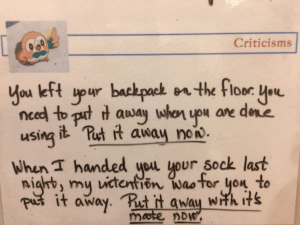One day, not so many years ago, my son shared with his therapist that when he hears me call his name or sees my name on his caller ID on his phone, he immediately gets nervous. He wonders what he did wrong and how angry I will be. While that was hard to hear as a parent who is utterly devoted to her son, it was so important. He spoke volumes. He held up a mirror for me to see myself, and I needed to change.
Temple Grandin is credited with saying, “The principle emotion experienced by autistic people is fear.” When my son was younger, I thought this had to do with not being able to anticipate what was expected of him or what would be happening next. And I still think this is true, but I also think it has something to do with the quantity of correction and redirection children and adults with autism experience every day. If you were to have someone keep track of the number of times you correct and redirect your child with autism vs. their typically developing siblings (if they have them), I would bet the numbers would be drastically different.
Seeing Competence vs. Seeing Incapability
When you come home at the end of the day and walk into your home, do you notice the things that are just how you expected them to be or the things that are amiss and not as you expected? If you are like me, you notice the latter. And if you are really like me, you say something to your family members who have neglected to do something or did something incorrectly. Our brains are wired to look for the aberrations. And this is where all that correction and redirection begins. We can’t help noticing all the errors.
Truly seeing what we expect to see for what it is, a reflection of someone’s effort or competence, is a skill that can go a long way in supporting someone with autism. It is something I have been working on as a parent for many years to support my son, who was diagnosed at the age of 3 and is 26 years old now – so a very long time! Every few years, I am reminded I need to up my game in this area. And that was what my son did when he talked to his therapist and they decided to share that comment with me.
Changing the Quality of the Interactions
As parents, we feel it is our responsibility to teach our children the right way to do things, the right way to be. Now that my son is an adult, our relationship is changing, and we are more focused on helping him navigate life as an adult with autism. I still want to teach him things, but if I am constantly correcting and redirecting him, his daily anxiety increases, he tends to avoid being with us, and our relationship is tense. There were days when I would come home and immediately launch into a verbal barrage of things that were not right. Some days, his response was a plaintive, “Can’t I do anything right?” And the truth is, he can. I just wasn’t noticing or acknowledging it in a meaningful way.
Going back to the basics that I know about autism interventions and strategies, I thought about how I could make these interactions visual instead of verbal, and make sure he heard the positive, while still having the opportunity to provide the feedback (correction and redirection). I needed to come up with something that would be easy for me to implement as well.
Compliments and Criticisms
I came up with a simple sheet called the Compliments and Criticisms Board. It is a rather simple sheet with half the space for compliments and the other half for criticisms. It is laminated so we can reuse it. And in creating the Compliments and Criticisms Board, I integrated one of his keen interests to encourage him to look at it.
Whenever I notice that he has done something appropriate, positive, helpful, or successful, I write it down. If I notice  something amiss, I write it down. He checks the board several times a day because just seeing the compliments is reinforcing in and of itself. Once he has seen the board, I can erase it so it is ready for the next time. The board is forcing me to look for those instances when he has made an effort or shown initiative. The board is also motivating him to make an effort because he likes to see if I notice and he gets a compliment. Win-win!!
something amiss, I write it down. He checks the board several times a day because just seeing the compliments is reinforcing in and of itself. Once he has seen the board, I can erase it so it is ready for the next time. The board is forcing me to look for those instances when he has made an effort or shown initiative. The board is also motivating him to make an effort because he likes to see if I notice and he gets a compliment. Win-win!!
My goal ultimately is to never lose sight of the quality of my relationship with my son. As I get older, I want for us to enjoy each other more. The Compliments and Criticisms Board has been a real boost for us in having more positive interactions than negative. It is helping me to be more mindful as a parent. And it is helping my son’s self-esteem and confidence. Yes, he can do things right!!
Nancy Popkin can be reached at npopkin@autismsociety-nc.org or 704-894-9678.
Tags: ASNC, Asperger Syndrome, Asperger's Syndrome, autism, autism anxiety, autism asperger parenting tips, autism nc, autism north carolina, autism society north carolina, autism society of NC, Autism Society of North Carolina, Autism spectrum, Autism Spectrum Disorder, Autism Spectrum Disorders, autism support

